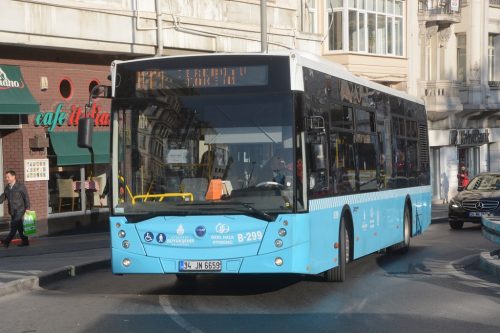
Four leading global manufacturers commit to making it easier for cities around the world to buy ‘green’ buses
Four of the world’s largest bus and engine manufacturers have committed to make it easier for major cities to purchase vehicles equipped with low emission technologies in order to tackle climate change and toxic air pollution. BYD, Cummins, Scania and Volvo Buses will ensure ‘soot-free’ engine technology is available for purchase in 20 megacities beginning in 2018. The manufacturers will each release through their websites a full product portfolio available in each city and will begin publicly reporting the number of soot-free buses sold in each year.[wlm_nonmember][…]
By subscribing you will benefit from:
- Operator & Supplier Profiles
- Face-to-Face Interviews
- Lastest News
- Test Drives and Reviews
- Legal Updates
- Route Focus
- Industry Insider Opinions
- Passenger Perspective
- Vehicle Launches
- and much more!
Soot-free is defined as including any engine that meets Euro 6 norms first established in Europe or EPA 2010 requirements from the United States, and any diesel engine with a diesel particulate filter, gas-powered engine, or a dedicated electric drive engine. Further reductions in climate impacts of soot-free buses are achievable with low-carbon fuels and engines that deliver the lowest lifecycle greenhouse gas emissions.
Cities involved in the scheme are Abidjan, Accra, Addis Ababa, Bangkok, Bogotá, Buenos Aires, Casablanca, Dar es Salaam, Dhaka, Istanbul, Jakarta, Johannesburg, Lagos, Lima, Manila, Mexico City, Nairobi, Santiago, Sao Paulo, and Sydney.
Less than 20% of all buses sold globally meet the definition of soot-free, with the vast majority being diesel powered. Older generation diesel technology produces high levels of black carbon emissions, or soot, which are amongst the most dangerous pollutants for public health and a major contributor to climate change. The cleanest buses today can reduce these emissions by more than 99%.
This global industry partnership on soot-free clean bus fleets is an initiative led by C40 Cities, the Climate and Clean Air Coalition (CCAC), International Council on Clean Transportation (ICCT), Centro Mario Molina Chile and UN Environment. It was announced at the CCAC Clean Buses for Clean Air Workshop in Paris.
“In Santiago, air pollution has been a prime challenge for the last three decades and buses are the major source for particulate matter and NOx pollution in the city,” said Governor of Santiago, Claudio Orrego. “Santiago was the first city in the country to commit to soot-free bus technology. But we can only succeed in creating cleaner air if we collaborate with the private sector to make this happen. I am pleased to see the global bus industry respond with their own commitment to bring these sustainable and clean buses to our cities. I’m confident with this commitment matched by the actions in our cities we will soon see the rapid end of high polluting buses on our streets.”
“I welcome the commitment of these bus manufacturers to respond to the desire of mayors to make cleaner, safer engine technologies available to millions of citizens in the global south,” said C40 Executive Director, Mark Watts. “This is yet another example of cities and the private sector working together to tackle the most urgent challenges that we face.”
“Air pollution is the leading environmental health risk today affecting millions of people, particularly those in our growing cities,” said Erik Solheim, Executive Director of the United Nations Environment Programme. “This agreement between some of the world’s leading bus manufacturers and some of the biggest cities in the world is an example of forward thinking private and public cooperation. Investment in technology, products, and business models that benefits people and our environment isn’t just good for the planet, it’s good for business.”
Isbrand Ho, Managing Director, BYD Europe, added: “I am delighted to attend this important event though of course for BYD, the world’s top largest maker of pure electric buses, we go beyond ‘soot-free’. All of our products for world markets are genuinely zero emissions. We thoroughly support the aims of the International Council on Clean Transportation (ICCT), UN Environment and Climate and Clean Air Coalition (CCAC) and C40.”
For his part Antonio Leitao, Vice President, Europe Area Business Organization, Cummins Inc, said: “We are thrilled to be part of this initiative with great partners who are committed to doing the right thing for our customers and the environment. Cummins is the global leader in low-emissions technologies and as always we want to help bring the cleanest and best-performing engines and technologies to cities around the globe.”
“To tackle the challenge of poor air quality and climate change, Scania is proud to offer clean bus solutions operating at lower cost than today’s conventional diesel operations,” said Karin Rådström Senior Vice President, Scania Buses & Coaches.[/wlm_ismember]


